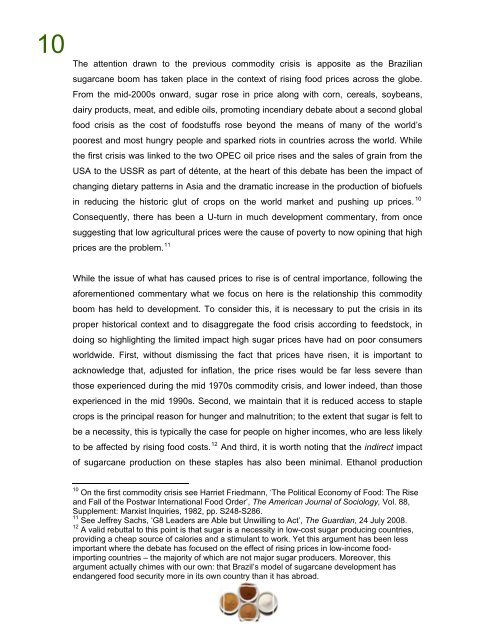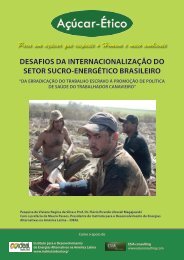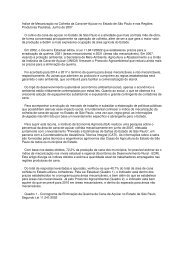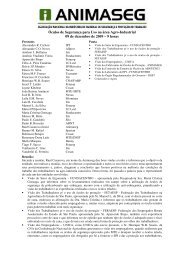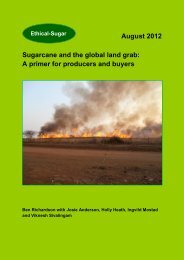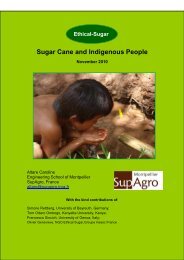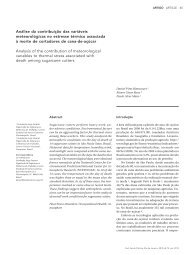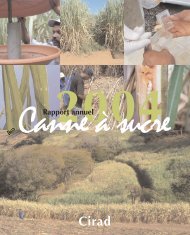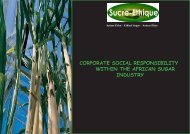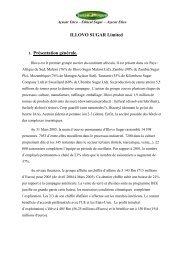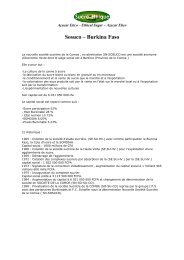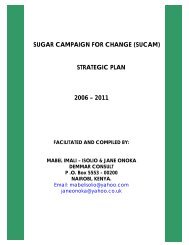The Development Model of Brazilian Sugarcane - Sucre Ethique
The Development Model of Brazilian Sugarcane - Sucre Ethique
The Development Model of Brazilian Sugarcane - Sucre Ethique
Create successful ePaper yourself
Turn your PDF publications into a flip-book with our unique Google optimized e-Paper software.
10<br />
<strong>The</strong> attention drawn to the previous commodity crisis is apposite as the <strong>Brazilian</strong><br />
sugarcane boom has taken place in the context <strong>of</strong> rising food prices across the globe.<br />
From the mid-2000s onward, sugar rose in price along with corn, cereals, soybeans,<br />
dairy products, meat, and edible oils, promoting incendiary debate about a second global<br />
food crisis as the cost <strong>of</strong> foodstuffs rose beyond the means <strong>of</strong> many <strong>of</strong> the world’s<br />
poorest and most hungry people and sparked riots in countries across the world. While<br />
the first crisis was linked to the two OPEC oil price rises and the sales <strong>of</strong> grain from the<br />
USA to the USSR as part <strong>of</strong> détente, at the heart <strong>of</strong> this debate has been the impact <strong>of</strong><br />
changing dietary patterns in Asia and the dramatic increase in the production <strong>of</strong> bi<strong>of</strong>uels<br />
in reducing the historic glut <strong>of</strong> crops on the world market and pushing up prices. 10<br />
Consequently, there has been a U-turn in much development commentary, from once<br />
suggesting that low agricultural prices were the cause <strong>of</strong> poverty to now opining that high<br />
prices are the problem. 11<br />
While the issue <strong>of</strong> what has caused prices to rise is <strong>of</strong> central importance, following the<br />
aforementioned commentary what we focus on here is the relationship this commodity<br />
boom has held to development. To consider this, it is necessary to put the crisis in its<br />
proper historical context and to disaggregate the food crisis according to feedstock, in<br />
doing so highlighting the limited impact high sugar prices have had on poor consumers<br />
worldwide. First, without dismissing the fact that prices have risen, it is important to<br />
acknowledge that, adjusted for inflation, the price rises would be far less severe than<br />
those experienced during the mid 1970s commodity crisis, and lower indeed, than those<br />
experienced in the mid 1990s. Second, we maintain that it is reduced access to staple<br />
crops is the principal reason for hunger and malnutrition; to the extent that sugar is felt to<br />
be a necessity, this is typically the case for people on higher incomes, who are less likely<br />
to be affected by rising food costs. 12 And third, it is worth noting that the indirect impact<br />
<strong>of</strong> sugarcane production on these staples has also been minimal. Ethanol production<br />
10 On the first commodity crisis see Harriet Friedmann, ‘<strong>The</strong> Political Economy <strong>of</strong> Food: <strong>The</strong> Rise<br />
and Fall <strong>of</strong> the Postwar International Food Order’, <strong>The</strong> American Journal <strong>of</strong> Sociology, Vol. 88,<br />
Supplement: Marxist Inquiries, 1982, pp. S248-S286.<br />
11 See Jeffrey Sachs, ‘G8 Leaders are Able but Unwilling to Act’, <strong>The</strong> Guardian, 24 July 2008.<br />
12 A valid rebuttal to this point is that sugar is a necessity in low-cost sugar producing countries,<br />
providing a cheap source <strong>of</strong> calories and a stimulant to work. Yet this argument has been less<br />
important where the debate has focused on the effect <strong>of</strong> rising prices in low-income foodimporting<br />
countries – the majority <strong>of</strong> which are not major sugar producers. Moreover, this<br />
argument actually chimes with our own: that Brazil’s model <strong>of</strong> sugarcane development has<br />
endangered food security more in its own country than it has abroad.<br />
Ethicl


